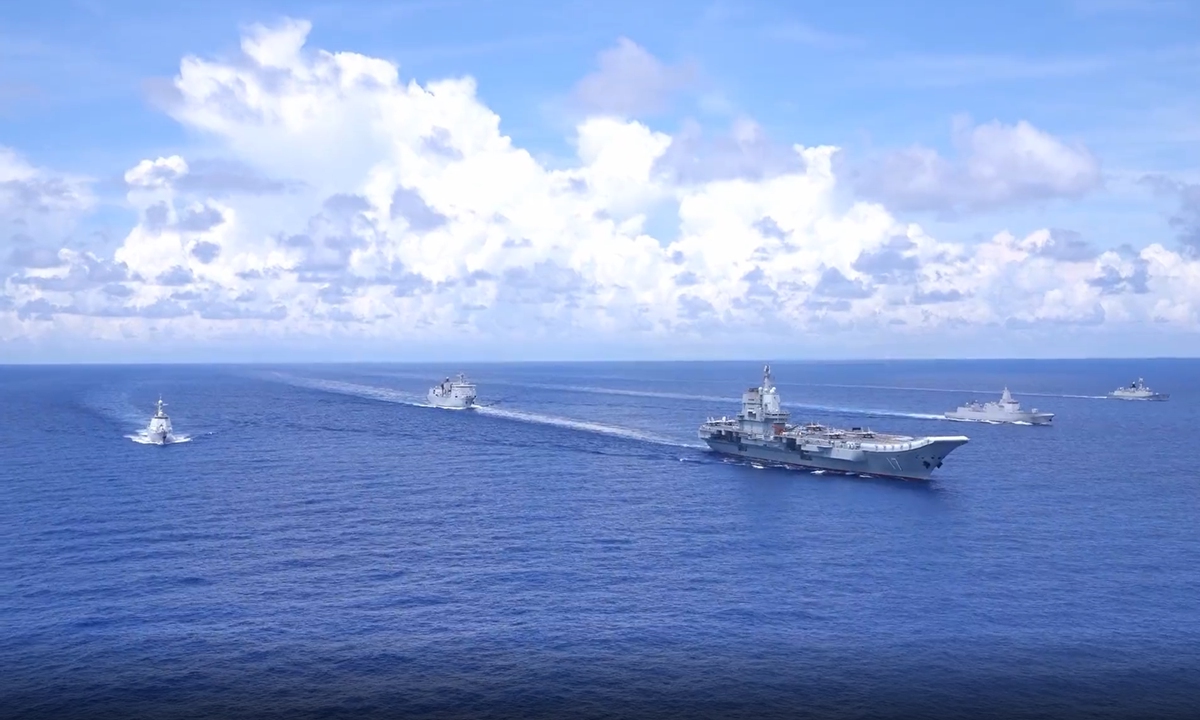
The Chinese People's Liberation Army (PLA) Navy's aircraft carrier Shandong conducts realistic combat-oriented exercises in the South China Sea in the early autumn of 2022. Photo: Screenshot from the WeChat account of the PLA South Sea Fleet
The aircraft carrier
Shandong of the Chinese People's Liberation Army (PLA) Navy has reportedly returned to the South China Sea from its latest far sea exercises in the West Pacific, where it hosted about 620 aircraft sorties, far surpassing the previous record set by the aircraft carrier
Liaoning.
Experts said on Tuesday that the
Shandong carrier group displayed its high capabilities in deterring "Taiwan independence" secessionist and foreign interference forces.
Japan's Maritime Self-Defense Force spotted a PLA Navy flotilla consisting of the aircraft carrier
Shandong, a Type 055 large destroyer, two Type 052D destroyers, two Type 054A frigates and a Type 901 comprehensive replenishment ship as they sailed from the West Pacific to the South China Sea via the Bashi Channel on Monday, according to a press release from Japan's Ministry of Defense Joint Staff published on its website on Tuesday.
This was also confirmed by the defense authority on the island of Taiwan in a press release on Monday, as it spotted the
Shandong carrier group as it was sailing through waters to the southeast of the island.
Japan has been reporting the
Shandong aircraft carrier group's movements since April 7 after it first entered the West Pacific from the Bashi Channel on April 5. In the 18 days' drills, the PLA Navy carrier hosted about 620 aircraft sorties, the Japanese Defense Ministry said.
This means that the
Shandong has broken the record
set by the Liaoning when the latter held a far sea exercise in about the same region from late December last year to early January this year. According to the Japanese Defense Ministry, the
Liaoning hosted about 320 aircraft sorties in 15 days.
This is the
Shandong's first far sea exercise beyond the first island chain since its commissioning in December 2019, and it displayed the carrier's high level of combat readiness, even surpassing that of the country's first carrier, the
Liaoning, a Chinese military expert who requested anonymity told the Global Times on Tuesday.
Intensive drills like this would also further enhance the carrier group's capabilities, the expert said.
A map depicting the
Shandong's positions since April 7 attached to the Japanese press release showed that the Chinese carrier first participated in the combat alert patrols and "Joint Sword" exercises encircling the island of Taiwan in waters to the east of the island from April 7 to April 12, then headed further east.
On April 15 and 16, it reached waters about 600 to 700 kilometers to the west of Guam, a militarized island used by the US as a key node in the second island chain, before returning through the Bashi Channel to the east of the island of Taiwan on Monday.
In addition, on Friday and Saturday, the PLA sent a total of four H-6K/J bombers - which are capable of carrying land attack, anti-ship and hypersonic missiles - from the East China Sea through the Miyako Strait deep into the West Pacific, Japan's Ministry of Defense Joint Staff said in two separate press releases on the two days.
The bombers likely conducted a joint exercise with the
Shandong carrier group against potential external military forces interfering in the Taiwan question, analysts said.
Wei Dongxu, a Beijing-based military expert, told the Global Times that the
Shandong is now fully operational, and its drills in the West Pacific can serve as a powerful deterrence against not only the "Taiwan independence" secessionist forces on the island of Taiwan, but also external military interference forces like the US.




